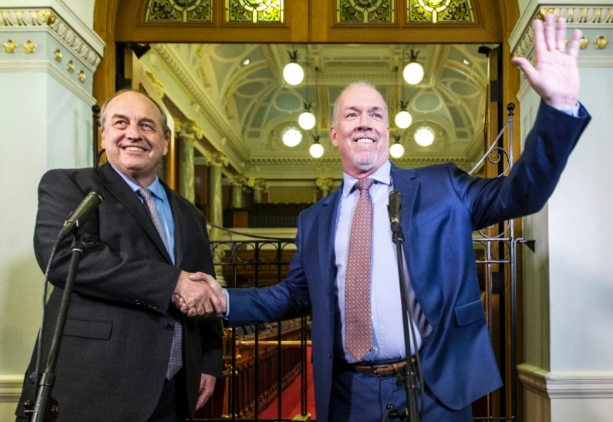With our new provincial coalition government sworn in merely weeks ago, there hasn’t been much fodder yet for the policy speculators on what this shift to the left will mean to B.C. commercial real estate. What with wildfires raging in the Interior and Christy Clark’s surprise announcement on vacating both her party leadership and MLA roles, there’s been more than enough to keep Premier Horgan et al busy. And with the B.C. Liberal Party effectively leaderless for a good six months and the NDP-Green government holding a two-seat majority in the legislature, our new government may be breathing life for longer than most of us thought (and some had hoped…?). The question is, how will it affect commercial real estate in our province?
Corporate tax rate
One policy plank where the NDP and Greens definitely dovetail is their desire to increase the corporate tax rate from 11 per cent to 12 per cent. And because they both want it, it will probably become a reality. Not technically real estate-related but it might affect the extent to which B.C. corporations invest in real property. But the NDP also wants to cut the small business tax rate to 2 per cent, which may allow true small businesses to afford more leased space for their operations.
Land restrictions
Both parties also want to strengthen the current Agricultural Land Reserve legislation, which was an NDP invention in the 90s. Given how necessary and valuable food production will be in the future, that isn’t necessarily a bad thing. But it will also have the effect of limiting the expansion of commercial land. Especially in the crowded southwestern corner of the province, there is a chronic dearth of serviceable commercial land.
Residential zoning
Both parties have stated that they wish to increase the supply of both “affordable” and rental/social/co-op housing. And the NDP have proposed allowing municipalities to zone areas where only rental housing can be built. Depending on which way all these things go and to what extent, they could affect commercial real estate values and those developers wishing to simply build and sell market-based housing. Again, get ready for a good deal of activity in this area because very probably, where their policies dovetail the governing partners will likely act decisively, as they will wish to demonstrate to the electorate how well their coalition is working (…it always comes down to politics doesn’t it..?). For their part, the Greens also want to establish an incentive program for commercial building retrofits.
Massey bridge
And consider this scenario: many people on both the residential and commercial sides of the real estate coin purchased property in Delta south of the Massey Tunnel in advance of a proposed new bridge being built over the Fraser River. They anticipated real estate values rising as a result of greater ease of access in and out of the city. It’s fair to say that something will be done but it’s also a pretty good bet that a) it ain’t gonna be a bridge and b) it’s going to now take a lot longer to figure out what it is going to be and how long it’s going to take to build whatever it ends up being. So, you real estate speculators south of the Fraser, it’s probably going to take longer than you previously thought to realize a big gain on anything you purchased down there.
Financing trends
Lastly, let’s turn our attention to a look at both local commercial financing trends plus the Feds’ influence on same. My commercial mortgage broker contacts tell me that with such low cap rates in the Greater Vancouver area, it’s tougher and tougher to get investment properties to support much more than about a 50 per cent loan-to-value ratio. And with commercial properties being such a hot commodity locally, it’s uncertain when that situation will change.
Further, with the Feds increasingly breathing down the necks of the financial institutions regarding foreign investment, funders are looking much more deeply into identifying ownership back to the key individuals (if they can…). If the true ownership lays buried under layers of holding companies and it’s very difficult to identify the real owners, often a financial institution will simply pass on the financing. And as much as possible the institutions want the individuals behind the holding companies to be residents of Canada so they have recourse in the case of default.
Never a dull moment in B.C. real estate!



